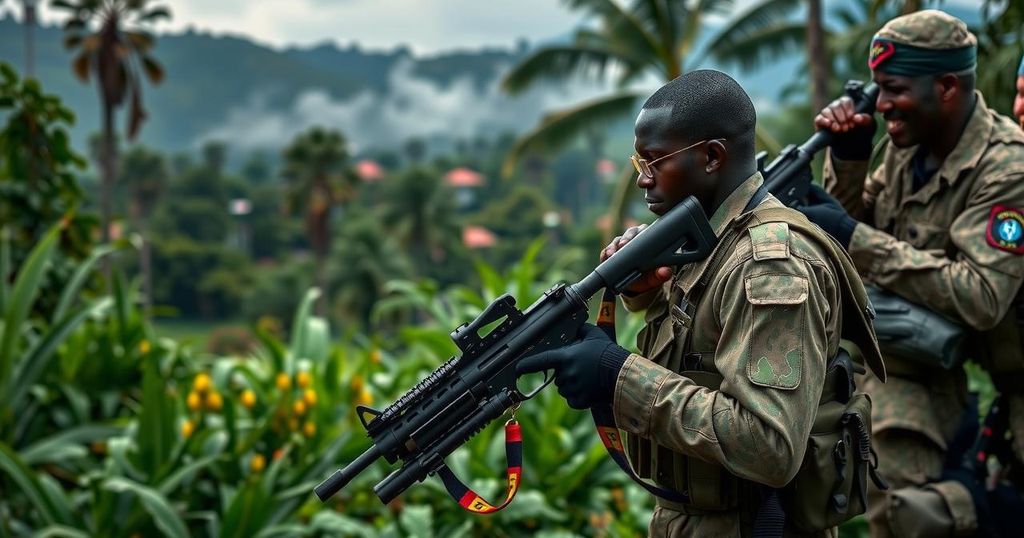The DRC government has accused the Rwanda-backed M23 rebel group of ethnic cleansing in eastern Congo. Interior Minister Jacquemain Shabani highlighted the violent expulsion of locals in Rutshuru and Masisi, coinciding with M23’s recent territorial administration. The conflict, intensified by various armed groups, has resulted in a humanitarian crisis, displacing over seven million individuals. Tensions between DRC and Rwanda continue, with allegations of Rwandan military support for M23 contributing to the instability.
The government of the Democratic Republic of the Congo (DRC) has formally accused the Rwanda-backed M23 rebel group of committing actions resembling ethnic cleansing in the eastern sector of the nation. Interior Minister Jacquemain Shabani expressed grave concerns regarding the influx of foreign populations into regions such as Rutshuru and Masisi in North Kivu, attributing this phenomenon to violent expulsions of local communities. “This is what constitutes ethnic cleansing,” stated Mr. Shabani in remarks made earlier this week. The allegations emerged shortly after M23 appointed new administrators in territories under their claimed control.
Amid rising conflicts in eastern Congo, where over 100 armed factions are competing for dominance, the re-emergence of the M23 has intensified violence significantly. This ongoing conflict has culminated in one of the world’s most severe humanitarian crises, displacing over seven million individuals, many of whom are unable to access essential assistance. Primarily consisting of ethnic Tutsis who defected from the Congolese army approximately a decade ago, the M23 rebel group gained notoriety in 2012 when they captured Goma, the largest city in eastern Congo, near the Rwandan border.
Congo’s government has accused Rwanda of committing war crimes and has invoked United Nations experts’ assertions that Rwanda is providing military support to the M23 group. Although Rwanda has denied these allegations, it acknowledged in February the presence of its troops and missile systems in eastern Congo, citing security concerns due to the accumulation of Congolese forces near its border. Estimates from UN experts indicate that there may be up to 4,000 Rwandan soldiers stationed in Congo. A truce sponsored by the United States and Angola has reportedly diminished fighting between Rwandan and Congolese troops, yet clashes between M23 and various militias persist. Notably, in August, confrontations between the rebels and pro-government militias tragically resulted in the deaths of 16 villagers despite the existence of a truce intended to mitigate the suffering of millions of displaced persons.
The Democratic Republic of the Congo has long grappled with insecurity and violence, particularly in its eastern regions, where numerous armed groups vie for control over resource-rich territories. The M23 rebel group, primarily composed of ethnic Tutsis, has a checkered history of conflict with both the Congolese army and other militias. Tensions between the DRC and Rwanda remain high, as accusations of external interference and support for armed groups in the region persist. The humanitarian impact of this conflict is dire, with millions displaced and in urgent need of aid. The complexities of the local ethnic dynamics and historical grievances exacerbate the situation, leading to accusations of ethnic cleansing and further international scrutiny.
The accusations leveled by the DRC government against the M23 rebel group underline the ongoing humanitarian and security crisis in the eastern regions of the country. The situation raises critical questions about regional stability and the role of foreign nations in local conflicts. The impact on the civilian population is profound, with significant displacements and unsustainable living conditions. As such allegations of ethnic cleansing linger, there is an urgent need for international intervention and humanitarian assistance to address the dire circumstances facing millions in the region.
Original Source: morningstaronline.co.uk






